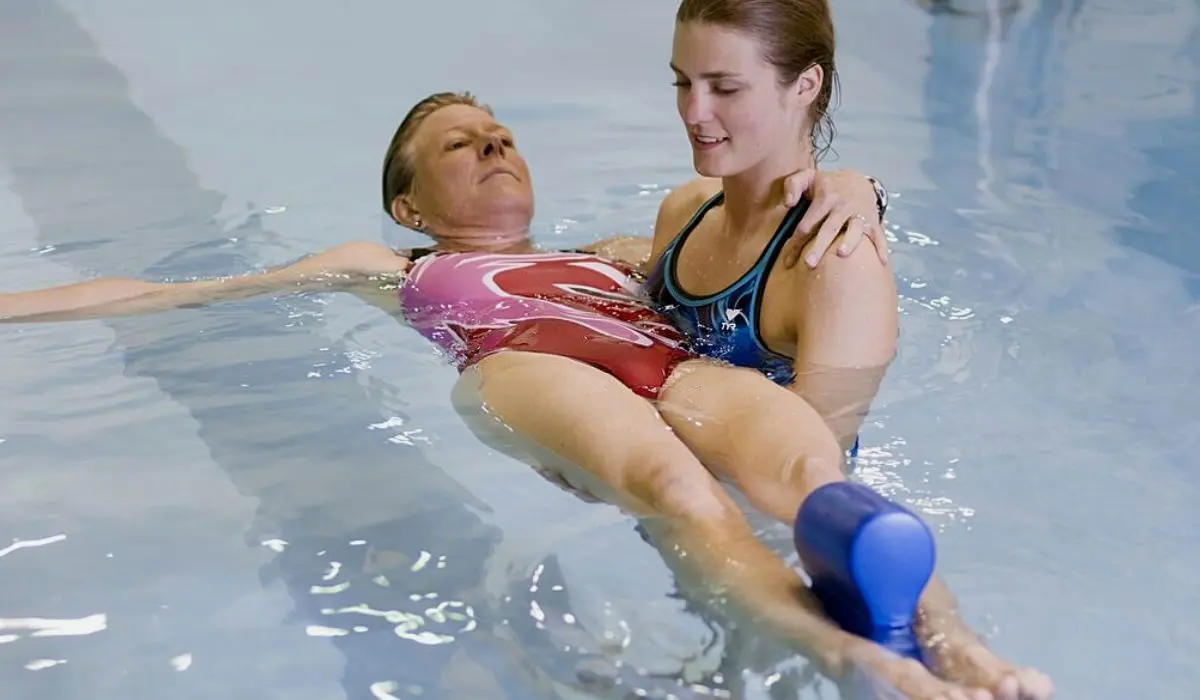Swimming, though otherwise considered as the most enjoyable form of sports, is unfortunately associated with injuries. The nature of injury caused by swimming has ultimately instilled the need to identify the cause and ways to prevent the same. Going forward, rehabilitative measures for the injuries caused will also be covered in this article to assist with getting back to normal functionalities and complete recovery.
Swimming Injury – Causes
🔹 Why Do Swimmers Become Injured?
Being a unique sport, especially because it involves both the upper and lower extremities and eventually, the whole body as part of strength training, swimming cannot, however, guarantee an injury-free exercise regime. Interestingly, many causes are attributable to swimming-related injury/ies. However, two major reasons happen to strongly rationalize these incidents, namely muscle overuse and faulty biomechanics.

- Overuse of Muscles: As previously stated, swimming is a sport that involves both upper and lower extremities. Regular or routine swimming is enough to cause overuse injury to the muscles of the arms and legs that are highly engaged in this activity.
- Faulty Biomechanics: This predominantly relates to what can be described as a “Swimmer’s Shoulder.’ Of note, improper swim stroke technique highly contributes to this condition. While this tendency, i.e., injury caused by this condition is common among the swimmers, this doubtlessly necessitates appointing professional coaches that are adept in identifying this condition as ways to prevent the same.
🔹 Other Causes Of Swimming Injury
While the above-mentioned reasons highly account for injury in swimmers, there have also been identified other related causes, which have been listed below:
- Poor Stroke Mechanics
- Poor Breathing Techniques
- Poor flexibility/range of motion of the neck-cum-lower back
- Hyperflexibility in joints and insufficient stabilization of the muscles.
- Decreased strength in the rotator cuff/scapular muscle.
- Insufficient core strength or stability.
- Decreased hip muscle strength.
- Overtraining/overstressing.
- Insufficient periods of rest.
Since the above-mentioned factors are explicable in themselves, it is needless to explain how they give rise to swimming injuries. It would be, however, worth pointing out here that they truly relate to the two major reasons specified above, i.e., overuse injury and faulty biomechanics. As it could be identified, poor stroke mechanics and poor breathing techniques have been identified to account for faulty biomechanics.
Given the rest, those being poor flexibility, hyper flexibility of the joints with insufficient muscle stabilization, decreased rotator cuff/scapular muscle strength, insufficient core strength, decreased hip muscle strength, overtraining/overstressing, and last, but not the least, an insufficient amount of rest between swimming exercises well account for overuse types of injuries.
Also Check:- The Benefits Of Aquatic Rehabilitation Equipment – Explored!
How To Prevent Swimming Injury?
Preparing the muscles well enough before the swimming exercise can effectively help prevent injuries. Since the unprepared muscles happen to be the root cause of swimming injury due to their poor performance, situations get even worse when these unprepared muscles are put to overuse.
This is enough to put a swimmer at greater risk of sustaining muscular injuries upon swimming. Of note, it is the shoulders, neck, lower back, and knees that become highly affected/injured. Informatively speaking, the fact that they are not warmed up sufficiently before the practice also accounts for the injury occurrence.
With all these being stated, the following measures have been identified to help prevent mishaps during swimming.
- Posterior shoulder stretch
- Stretching the pectoralis muscles
- Long-head biceps stretch
- Mobility stretch for the upper thoracic spine and latissimus dorsi
Note: Since swimming, as stated above, involves the entire body, it is essential for the muscles or muscle groups included there to be prepared/warmed up in advance to prevent any form or severity of an injury associated with this exercise.
Possible Rehabilitations For Swimming Injury
It would be worth mentioning here that understanding the biomechanics and the injuries resulting from the same will considerably help initiate specific treatment followed by optimizing prevention and rehabilitation strategies. To this end, the following are the measures best for rehabilitative purposes:
- Strength Training: Emphasis on rotator cuff and scapular muscles to improve shoulder stability, and strengthening the quadriceps and hip muscles to improve breaststroke kick. Equal attention should be bestowed on addressing the abdominal muscles and core.
- Resistance Training: Utilizing equipment such as pull buoys or paddles to help with gradual resistance in the water can provide sport-specific strengthening and prevent further injuries.
Conclusion
Swimming in itself is considered to be a type of rehabilitation to heal muscle sprains, strains, and injuries. This is because of the low weight-bearing environment it offers. Nevertheless, the likelihood of injuries sustained in this type of exercise cannot be ruled out, especially for the faulty biomechanics involved in terms of improper swim stroke techniques.
With the hands and legs extremely involved in swimming, it is, therefore, necessary to prepare the underlying muscles well before the activity. As such, proper strength-cum-resistance training for the concerned muscles, and allowing them to warm up adequately will help release possible muscle tensions and strain to engage in swimming without any worries or impending risk of getting injured.